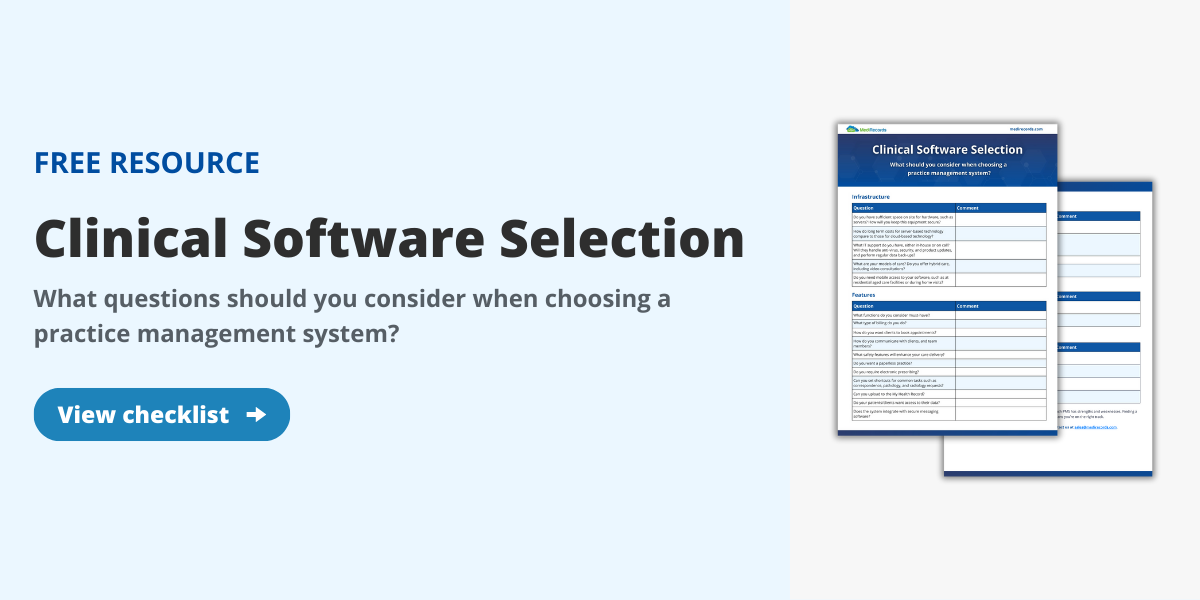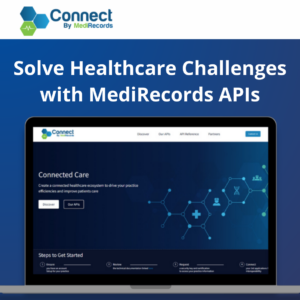February 20, 2024
What to consider when selecting a practice management system?

Looking for a new system to manage your practice, clinical notes, and patient records? What should you be looking for in a software solution?
Delve into the following factors to consider when seeking a healthcare practice management system. These insights come from conversations with our customers, decades in digital health, and personal experience as healthcare consumers.
1. System architecture
When navigating PMS options, one of the first crucial decisions is whether to opt for a server-based or cloud-based system. Evaluate the long-term costs, encompassing initial setup, subscriptions, IT support, and maintenance. It’s important to tailor your choice to your practice’s model of care, whether it’s virtual care/telehealth, bricks-and-mortar, or a hybrid approach.
Read our article, “Eight Reasons to Embrace Cloud Technology in Healthcare” to learn how cloud technology can help in substantial cost savings, potentially saving your practice $600k in 10 years.
2. Feature requirements
To maximise the efficiency of your healthcare delivery, it’s essential to define specific feature requirements tailored to your practice. From appointment booking to electronic health records and billing, identify key elements such as ePrescribing, Medicare billing & claiming, online booking, My Health Record integration, secure messaging, patient portal functionality, investigation requests, and robust reporting capabilities.
3. Training and support
A successful integration of a PMS into your healthcare setting relies heavily on the training and support provided by the vendor. It’s important to enquire about the level of training and ongoing support offered by the PMS vendor, and to assess the available support mechanisms for addressing any day-to-day operational issues.
4. Evaluate other key aspects –
Other important factors to consider include the following:
- Ease of use: Ensure the system is user-friendly, promoting an efficient workflow within your team.
- Mobile accessibility: Verify if the PMS allows remote access, facilitating flexibility and on-the-go management.
- Interoperability: Confirm the system seamlessly integrates with other healthcare systems, promoting efficient information exchange.
- Security and compliance: Ensure the PMS adheres to necessary regulations to safeguard patient data, maintaining the highest standards of security.
The truth is every practice has slightly different needs and workflows so no practice/patient management system will be a perfect fit. Each will have strengths and weaknesses and potentially require compromise to accommodate your team’s unique requirements. Finding a flexible, robust system that can tick most of the boxes, now and tomorrow, suggests you’re on the right track.
Contact our Sales team today to discuss how MediRecords cloud-based software can help you.
Sign up to the newsletter
- What’s happening in health? - 16/07/2024
- Feeling the heat at
Burning GP - 18/06/2024 - Solve Healthcare Challenges with MediRecords APIs - 13/06/2024





